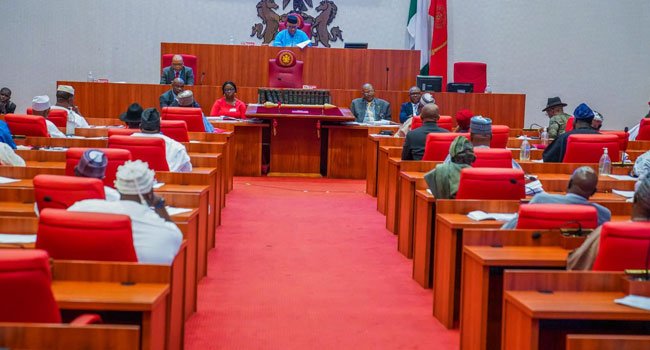CBN Amendment Act bill passes second reading at Senate

On Tuesday, the Senate passed a bill proposing to modify the Central Bank of Nigeria Act, 2007.
The bill was introduced by 41 members of the Committee on Banking, Insurance, and Other Financial Institutions.
Leading the debate on the general principles of the bill, Chairman of the Committee Sen. Adetokunbo Abiru (APC-Lagos) stated that the bill was first read on January 30th.
He stated that the CBN’s authority is drawn from the 1958 Act of Parliament, which was revised in 1991, 1993, 1997, 1998, and 2007.
Abiru stated that the present statute of 2007, which gives the bank total control and administration of the federal government’s monetary and financial sector policies, has not been altered in more than 16 years, despite growing changes to the bank’s balance sheet.
He also mentioned that fiscal supremacy and the fast changing financial landscape posed problems to monetary policy execution.
According to Abiru, the proposed revisions aim to increase the bank’s ability to carry out its primary mandate of maintaining monetary and price stability in support of the government’s economic growth objectives.
He explained that the revision was intended to align its governance processes with global best practices.
He claimed that the current act had no provision for coordinating monetary and fiscal policy, which explains why the bank’s monetary policies frequently stray from fiscal measures, harming the economy.
According to him, the measure establishes a Coordinating Committee for Monetary and Fiscal Policies to oversee monetary, fiscal, and trade policy coordination.
He listed the committee’s functions, which included:
“Establishing internally consistent monetary and fiscal policy aims aimed at managing inflation and improving financial conditions for long-term economic growth.
“Applying caps to any fiscal deficit at a level that can be financed without having recourse to direct monetary financing from the Bank, that is Ways and Means.”
He stated that the proposed group will include the Minister of Finance as Chairman, the Minister of Budget and Economic Planning, the Minister of Industry, Trade, and Investment, the Minister of Agriculture, and the Governor of the Central Bank of Nigeria.
According to Abiru, other officials include the President’s Chief Economic Adviser and the Securities and Exchange Commission’s Director General.
According to the senator, the measure also recommends amending the rule to allow the Governor and Deputy Governors to serve a single six-year non-renewal term.
This, he noted, is the practice of several autonomous banks, including the US Federal Reserve and the European Central Bank, whose CEOs serve only one non-renewable term.
According to him, empirical evidence shows that using a single term for central bank executive and board members reduces political influence on monetary policy decisions as well as the time inconsistency problem associated with non-independent central banks.
